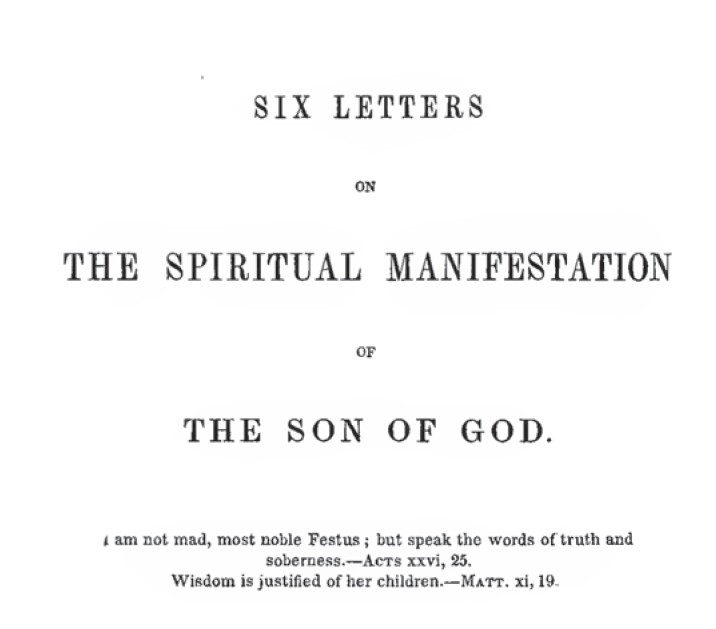
Fletcher of Madeley (1729-1785), one of the first Methodist theologians, wrote a small spiritual masterpiece called Six Letters on the Spiritual Manifestation of the Son of God. It gets republished now and then: In a 1968 printing, Martyn Lloyd-Jones called it “undoubtedly a spiritual classic” that “points us to the one thing that finally matters.”1 There are some unfortunately simplified versions of it out there that I can’t recommend; I say embrace the book’s full, eighteenth-century quirkiness and glory by reading an older edition. There’s a pdf uploaded here.
Fletcher leads out with an emphasis on direct and immediate spiritual experience of the presence of Christ: this is heart religion in early Methodist style. His key claim is that “the Son of God, for purposes worthy of his wisdom, manifests himself, sooner or later, to all his sincere followers, in a spiritual manner, which the world knows not of.” And, sounding just like John Wesley or Jonathan Edwards, Fletcher is very excited about the idea of spiritual senses, the senses by which Christ is manifested to us. So far, fairly predictable for an author who championed “evangelical mysticism.” This is recognizably the same piety that animated Bernard of Clairvaux (“Jesu dulcis memoria…”) and the people who can sing wholeheartedly, “he walks with me and he talks with me, and he tells me I am his own.”
But moving around in the background of this text is a set of trinitarian commitments that I think ought to be drawn out a bit more. Yes, we meet Jesus, and Fletcher is careful to phrase that in such a way that the initiating agent of the meeting is Jesus himself: “The Son of God…. manifests himself.” But that’s just the carefully chosen short version of the claim. When he unpacks it a little bit, he makes explicit what he always presupposed, which is the trinitarian foundation: “The agent or author of every Divine manifestation is the eternal God, one in three, and three in one. The Father reveals, the Son freely discovers himself, and the Holy Ghost freely testifies of him. Nevertheless, the Scriptures, in general, attribute this wonder of grace to the blessed Spirit.” So what Fletcher shorthands as the self-manifestation of the Son of God is in fact an undivided work of the Trinity, with the Holy Spirit playing the decisive role at the point of contact.
What Fletcher is less explicit about is the theology of the mission of the Son of God behind this spirituality. The most obvious place to spot it is in the way he traces the presence of Christ throughout the Old and New Testaments. Fletcher emphasizes the New Testament, mainly because it is the resurrection of Jesus is what provides the power of new creation; it is this new creation that supports the spiritual senses by which Christ can be encountered in his self-manifestation: “In believers, this hidden man is awakened and raised from the dead, by the power of Christ’s resurrection. Christ is his life, the Spirit of God is his spirit, prayer or praise his breath, holiness his health, and love his element.”
Fletcher is committed to showing how the Son of God manifested himself to every Old Covenant believer. Again, a lot of the heavy-duty argumentation is missing, but Fletcher loads the argument by calling Christ by the title Jehovah-Jesus at the beginning of the chapter. What follows is a sermonic series of references to divine manifestations from Adam to Isaiah, not closely argued but simply paraded as examples. Fletcher moves next to the New Testament, where he sharpens the distinction between the physical presence of Christ and the spiritual self-manifestation of Christ. The whole course of Christ’s life comes under this illuminating contrast: At the beginning of his life, Mary “gloried more in having him revealed as God in her soul, than in finding him conceived as man in her womb.” And at the end, both thieves on the cross saw and heard Christ, but “one continued to make sport of his sufferings,” while “the other, blessed with an internal revelation of his Godhead, implored his mercy, trusted him with his soul, and confessed him to be the King of glory at the very moment when he hung tortured and dying as the basest of slaves.”
As a reader of classic spiritual texts, I think Fletcher’s Six Letters achieve their goal: this is devotional writing that powerfully evokes the reality it describes. The book has sparked at least one known revival (which led to the Primitive Methodist movement). As a theologian who likes to see how the details relate to the big picture, I would love to hear a little more about what Fletcher leaves in the background: how the Son of God’s self-manifestation is in fact an invisible mission of the Son, and how that illumines spiritual experience from the Old Testament to today.
____________________________
1Alert readers will notice this commendation by a trusted Calvinist, ensuring that the book here recommended does not carry Arminian cooties. The imprimatur is to be understood as effective for the entire book, but not, of course, for Fletcher’s other works.